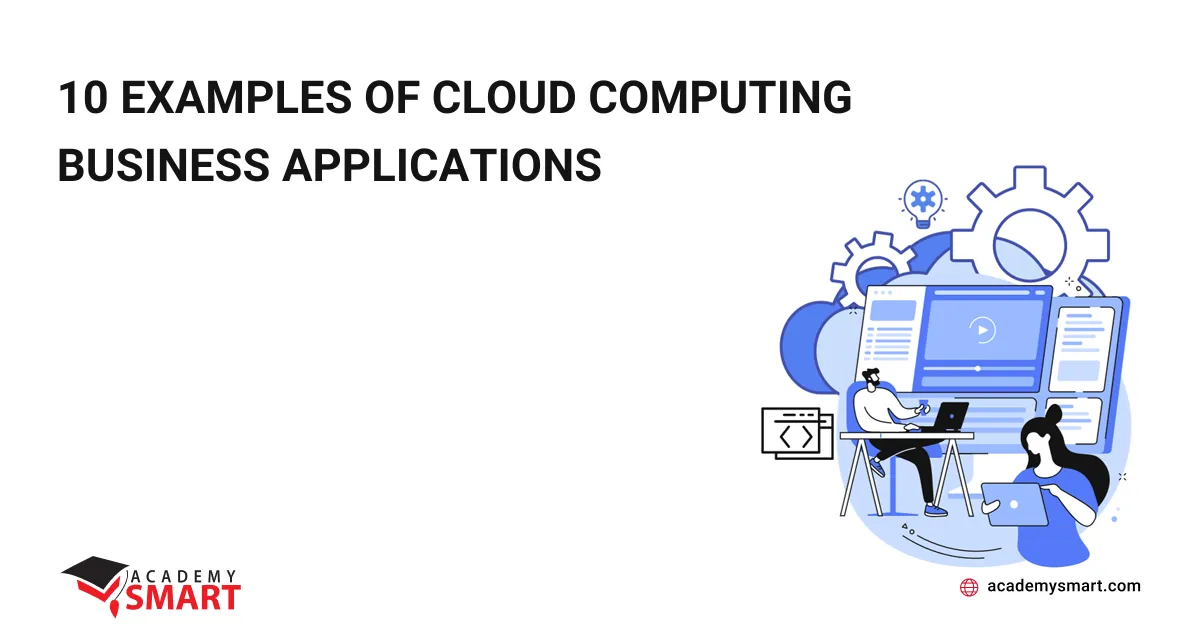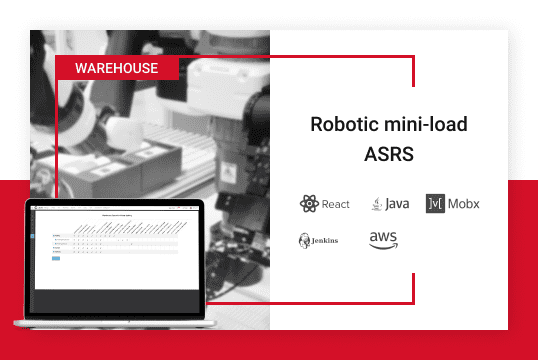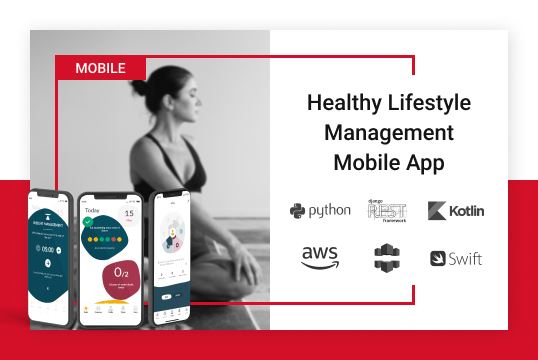
10 Examples of Cloud Computing Business Applications
Contents
Cloud computing offers several compelling advantages for enterprises of all types. It eliminates the need for companies to invest heavily in physical infrastructure. Cloud services provide ubiquitous access to applications, data, and resources, facilitating collaboration and allowing businesses to scale up or down based on their requirements. Cloud computing supports various applications, from email and data storage to advanced functionalities like big data analytics, machine learning, and application development. This versatility makes it applicable across multiple industries and business functions. Let’s look at some interesting examples of real-life cloud computing closer.
Cloud Services for Scalable Computing over the Internet
Cloud services enable businesses to access and utilize computing resources remotely. Various providers offer different cloud computing tools, allowing enterprises to scale their computing infrastructure based on their practical needs.
Companies can leverage cloud solutions for data storage, processing, and application hosting without significant on-premises hardware investments. The key advantages include cost-effective access to computing power, flexibility in resource allocation, and the ability to offload infrastructure maintenance. This scalable and on-demand nature of cloud services supports businesses in optimizing their operations, enhancing efficiency, and adapting to changing demands in a technologically dynamic environment.
Previously, we looked at several layers of cloud computing that an enterprise can leverage, depending on its specific tasks. This time, we will focus on examples of cloud computing business applications that leverage cloud computational power to provide particular business functionality. These apps are usually developed and delivered under the Software-as-a-Service (SaaS) model.
Application of Cloud Computing in Various Fields
SaaS apps improve business operations by supplying flexible, accessible, and secure cloud-hosted solutions, allowing enterprises to focus on core competencies. With rapid deployment, regular updates, and built-in analytics, SaaS cloud computing transforms how companies leverage technology for the efficiency of various business processes.
Generally, enterprise SaaS solutions offer a centralized database, allowing for efficient storage, retrieval, and management of critical business data. Cloud-based tools and systems are scalable, accommodating businesses’ growth and changing needs without requiring significant upfront investments. SaaS applications can be accessed from anywhere via an internet connection, facilitating seamless real-time communication and coordination. Cloud computing tools eliminate the need for on-premises hardware and associated maintenance costs. Moreover, cloud providers handle updates and maintenance, implementing robust security measures. At last, software applications in the cloud easily integrate with other business apps, creating a cohesive and interconnected digital ecosystem within the organization.
Below are ten compelling examples of cloud computing business applications that are very practical and in demand across diverse industries.
Enterprise Resource Planning software
ERP system is a comprehensive business application that consolidates data from different departments, providing a centralized database for managing information related to finance, human resources, supply chain, manufacturing, and more. It automates routine tasks and workflows like financial transactions, order processing, and inventory management, reducing manual efforts and enhancing efficiency. Of course, ERP software provides robust reporting and analytics tools, enabling businesses to derive meaningful insights from their data. Moreover, ERP facilitates collaboration by providing a unified platform where teams across different departments can access and share real-time information, ensuring better communication.
Examples of cloud ERP applications include the following:
- Oracle NetSuite provides cloud-based ERP with modules for financial management, supply chain, and project management, offering a unified platform for business operations.
- Microsoft’s cloud ERP solution integrates seamlessly with other Microsoft 365 applications, providing comprehensive financial and operational management capabilities.
- SAP’s cloud ERP platform offers end-to-end business processes, advanced analytics, and a user-friendly interface catering to the needs of various industries.
Supply Chain Management systems
Cloud-based SCM systems are sophisticated business applications designed to optimize various aspects of supply chain management. They serve for handling critical procurement, manufacturing, logistics, and distribution data. By automating key processes, such as inventory management, order fulfillment, and demand forecasting, cloud SCM reduces manual efforts, enhancing overall operational efficiency. Accessible through Software-as-a-Service, Supply Chain Management systems facilitate fast real-time coordination among different stakeholders in the supply chain, promoting enhanced responsiveness.
Illustrating the effective cloud SCM are:
- SAP’s cloud SCM solution encompasses demand planning, inventory optimization, and supply chain collaboration, delivering advanced analytics and insights for efficient decision-making.
- Oracle’s cloud-based SCM system offers procurement, manufacturing, and logistics modules, providing a unified platform for comprehensive supply chain management.
- Microsoft’s cloud SCM application integrates perfectly with other Microsoft 365 apps, offering end-to-end visibility and control over supply chain processes.

Cloud AI-driven application for robotic warehouse automation
Data Analytics and Business Intelligence
Data Analytics and Business Intelligence (BI) systems are powerful tools designed to transform raw data into meaningful insights, driving informed decision-making within the enterprise. Automation features simplify vast dataset processing tasks, reducing manual efforts and enhancing overall efficiency in uncovering actionable insights. Realtime cloud services for Data Analytics and BI leverage scalable architectures, adapting quickly to varying data volumes and evolving business needs.
Examples of cloud Data Analytics and BI solutions extend:
- Amazon QuickSight is a cloud-powered BI service by AWS, offering fast and easy-to-use data visualization and business intelligence.
- Google Analytics 360 provides advanced analytics for businesses, offering insights into user behavior, website performance, and marketing effectiveness.
- Tableau for Salesforce offers cloud-based BI solutions that enable users to visualize and understand data. It supports interactive dashboards, data exploration, and sharing insights across organizations.
- Qlik Sense is a cloud-based BI platform that allows users to create and share interactive data visualizations and reports.
- Looker provides a cloud-based data platform that facilitates exploration and collaboration for teams, allowing them to make data-driven decisions.
Human Resources Management Systems
Human Resources Management Systems (HRMS) are complex business applications designed to manage various aspects of a company’s staff efficiently. These cloud software operate with critical HR-related data such as employee information, payroll, benefits administration, and performance tracking. Earlier, we wrote about how to build an HRMS app in detail.
Examples of cloud HRM applications include:
- Workday is a cloud-based HRMS offering comprehensive solutions for human capital management, including payroll, talent management, and workforce planning.
- BambooHR is a cloud HRMS platform focused on HR processes such as employee records management, applicant tracking, and performance management.
- UltiPro is a HRMS offering a suite of HR, payroll, and talent management solutions catering to various HR needs.
- ADP Workforce Now is a cloud HRMS application providing services for payroll, time and attendance, talent management, and benefits administration.
Customer Relationship Management applications
Customer Relationship Management (CRM) applications are popular business tools designed to enhance customer interactions, control sales processes, and improve overall customer satisfaction. These systems manage customer-related data, including contact information, communication history, and sales activities.
Examples of cloud computing CRM tools include:
- HubSpot provides a cloud CRM platform with marketing, sales, and customer service features. It focuses on inbound marketing, lead generation, and seamless integration with other HubSpot tools.
- Zoho CRM is a cloud-based solution providing tools for lead management, pipeline tracking, and customer communication. It is known for its user-friendly interface and customization options.
- Pipedrive is a CRM application for sales teams, offering features for managing deals, contacts, and sales pipelines. It focuses on simplicity and ease of use.
Financial Management Applications
Financial Management apps are robust tools designed to govern and optimize various enterprise monetary processes and manage financial data, including accounting, budgeting, invoicing, and reporting.
Among examples of cloud computing solutions for financial management are the following:
- Oracle Fusion Cloud Financials is a comprehensive cloud-based financial management solution that includes general ledger, accounts payable, accounts receivable, and more modules.
- Sage Intacct is a financial management app designed for mid-sized organizations. It includes modules for core financials, order management, and subscription billing.
- QuickBooks Online is a cloud-hosted accounting solution catering to small and medium-sized businesses. It offers features for bookkeeping, invoicing, and financial reporting.
- Xero is a cloud accounting software application with a user-friendly interface. It provides tools for invoicing, payroll, and expense tracking, which is suitable for startups.
Event Management platforms
Event Management platforms are all-encompassing tools meticulously crafted to facilitate the intricate processes involved in planning, organizing, and executing events. Typically, they include event registrations, ticketing, fostering attendee engagement, and providing insightful post-event analytics.
Examples of cloud-hosted Event Management apps are:
- Cvent is a widely used cloud-based event management platform offering event registration, venue selection, marketing, and attendee engagement features.
- Eventbrite is a popular cloud platform for event management and ticketing, catering to various events, from small gatherings to large conferences.
- Bizzabo is a cloud event management platform that focuses on enhancing attendee experiences. It includes features for registration, networking, and event analytics.
- Whova is a cloud-based event management and networking platform offering tools for agenda management, attendee engagement, and virtual/hybrid events.
- Splash is an event marketing and management platform in the cloud. It provides features for event promotion, registration, and post-event analytics.
Collaboration and communication tools
Cloud-based collaboration tools are essential for seamless business interaction and cooperation. They operate in the cloud, providing a robust foundation for communication, document sharing, and teamwork. They enhance inner connectivity, enabling efficient workflows and fostering effective communication.
Well-known collaboration cloud tools list includes:
- Google Workspace offers a suite of collaboration tools, including Gmail, Google Drive, Google Meet, and Google Docs, empowering teamwork and communication.
- Zoom is a cloud-based video conferencing platform widely used for virtual meetings, webinars, and online collaboration.
- Asana is a cloud project management and collaboration tool that enables teams to organize tasks, track progress, and communicate effectively in a shared workspace.
- Slack is a popular cloud communication tool focusing on real-time messaging, channel-based organization, and integration with other productivity apps.
Media streaming services
These digital platforms enable audio and video content streaming over the internet. Operating in the cloud, they provide users instant access to a vast library of media content without extensive downloads. They offer seamless playback and often include features like personalized recommendations and user profiles.
The most known examples of cloud media streaming services include:
- Netflix is a leading streaming service utilizing cloud computing to offer a wide range of movies, TV shows, documentaries, and original content with a high personalization rate.
- YouTube is a popular cloud-based video-sharing platform that allows users to upload, share, and view videos.
- Spotify is a cloud music streaming service that provides users access to a vast library of songs, playlists, and podcasts.
- Amazon Prime Video is a cloud streaming service within an Amazon Prime subscription. It offers various movies, TV shows, and original content.
- Disney+ is a streaming platform in the cloud featuring Disney, Pixar, Marvel, Star Wars, and National Geographic content.
Healthcare Information Systems
Healthcare applications are advanced software tools for managing healthcare-related data, processes, and communication. These systems provide secure and accessible platforms for medical professionals to gather, store, and organize patient information, medical records, and administrative tasks.
Examples of cloud Healthcare Information Systems include:
- Epic Systems offers a cloud-based electronic health record (EHR) system that integrates various aspects of healthcare management, from patient records to clinical workflows.
- Cerner provides a cloud platform for healthcare information management, including electronic health records, population health management, and revenue cycle solutions.
- Allscripts offers cloud HISs encompassing electronic health records, practice management, and revenue cycle management for medical organizations.

Cloud-based healthcare application Academy Smart delivered
Enter in Cloud Computing with Academy Smart
As a proficient IT agency, we offer outstaffing and custom software development services. With over 14 years of experience, we’ve worked in Europe, America, the Middle East, and Africa, delivering 100+ web and cloud applications for desktop and mobile.
Our team has 100 skilled IT specialists with diverse industry backgrounds. Hiring our developers can boost your team’s creativity and productivity. Are you looking for expertise in JavaScript, Python, or Java for cloud computing solutions? Contact us for reliable software development help.
Frequently Asked Questions: Cloud Computing Examples in Real Life
What are the benefits of cloud computing for startups?
Cloud services allow startups to quickly launch their products and services without the upfront investment in hardware and software.
What are the future trends in cloud computing?
Cloud computing continuously evolves, with emerging trends such as hybrid cloud architectures, artificial intelligence (AI), machine learning (ML), and edge computing.
